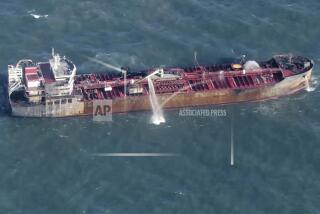China seeks to limit damage from oil spill
- Share via
Reporting from Beijing — The ground shook when the first oil pipeline burst, leading residents and port workers near Dalian’s Xingang Harbor to think an earthquake was underway.
Instead, what locals were witnessing was China’s most recent environmental mishap.
Two oil pipelines near the port exploded Friday, igniting a roaring inferno that shot flames 60 feet into the air and spilling an estimated 11,000 barrels of oil into the Yellow Sea.
No serious injuries were reported and the fire was brought under control Saturday, authorities reported, but as of Monday, hundreds of vessels were trying to clean up a slick that extended for miles. Port operations in the area were expected to be closed for at least a week.
Environmentalists, meanwhile, were trying to assess the damage to the popular beaches and fisheries at one of China’s most important seaports. Smoke from the fire shrouded much of downtown Dalian over the weekend.
The extent of the damage will depend on such variables as containment of the oil, said Fu Guo, a professor at the Chinese Research Academy of Environmental Sciences. A large shellfish farm, operated by Zhangzidao Fishery Group, is about 50 miles from the site of the spill.
“There have been accidents in the past, but this one was more serious,” Fu said. “The spill happened close to the city, so the impact on residents may be more severe.”
China National Petroleum Corp., the nation’s largest oil company and owner of both pipelines in Dalian, has not announced the cause of the accident, but authorities are investigating the role of a Liberian-flagged oil tanker that was unloading when the explosions occurred. Chinese analysts say the accident may have resulted from the improper loading of oil from ships to the harbor’s storage tanks.
“The oil leak has been contained. The fire is under control. There is no new oil leaking into the sea,” Jiang Jiemin, general manager of the oil company, said in a statement released Monday. He said the company would “learn from this and step up our safety measures.”
Chinese officials and analysts said the Dalian spill was far smaller than the BP spill in the Gulf of Mexico.
Chinese companies and officials have garnered a bad reputation for flouting environmental and safety concerns for the sake of economic growth. A string of accidents capped by the Dalian explosions has prompted concerns about the country’s environmental and safety practices.
In December, a large amount of diesel fuel began leaking out of a pipeline operated by the oil company in Shaanxi province, polluting a tributary of the Yellow River and threatening water supplies.
Dalian’s Xingang oil port is one of four major storage locations in China and one of the first regions developed as part of the nation’s strategic petroleum reserve, an emergency fuel store established in 2007. About 19 million barrels of oil are stored at the port. At one point over the weekend, there were fears that the fire in Dalian harbor could reach the oil tanks.
Authorities’ response to the Dalian explosions may signal an improvement in crisis management. In 1989, an oil tanker on Huangdao, an island off the coast of Shandong province, was struck by lightning and burst into flames. It took five days to put the fire out.
In Dalian on the day of the explosions, more than 2,000 firefighters worked overnight and managed to extinguish the blaze in about 15 hours. Equipment was shipped from other Chinese provinces. By Sunday, several thousand yards of oil containment booms had been set up and at least 20 oil skimmers were dispatched to collect the oil. More than 500 fishing boats were also deployed with oil absorbent materials and dispersants to help with the cleanup.
Kuo is with The Times’ Beijing Bureau. Tommy Yang of the bureau contributed to this report.
More to Read
Sign up for Essential California
The most important California stories and recommendations in your inbox every morning.
You may occasionally receive promotional content from the Los Angeles Times.












